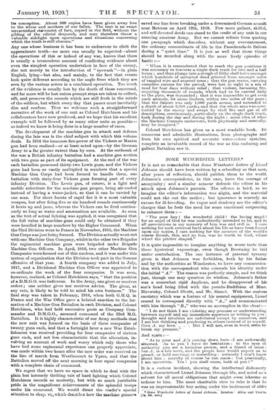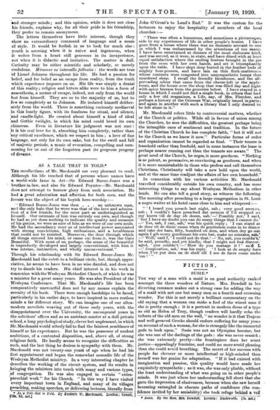SOME WINCHESTER LETTERS.*
IT is not so remarkable that Some Winchester Letters of Lionel Johnson should have been written by a schoolboy as that men, after years of reflection, should publish them to the world. Johnson's correspondents, in this case, have the courage of anonymity ; and a similar armour defends the editor in his' attack upon Johnson's parents. The offence is brief, as we imagine the editor's information was slight, and the material could not eke out the malice ; but ignorance is scarcely an excuse for ill-breeding. So vague and shadowy are the editor's charges that he feels the need for some emotional outpouring to enhance them :— "The poor boy! the wonderful child! the loving angel ! for an angel of God he was undoubtedly intended to be, and in all associations in my memory of him was and still hi. I care nothing for such external facts about his life as have been forced upon my notice, I care nothing for the measure of the world's coarse thumb, this, and no less, was he worth to God, whose wheel the pitcher shaped."
It is quite impossible to imagine anything in worse taste than these hysterical vapourings, even though Browning be laid
under contribution. The one instance of paternal tyranny given is that Johnson was forbidden, both by his father and by the authorities at Winchester, to have any communica- tion with the correspondent who conceals his identity under
the initial "A." The reason was perfectly simple, and we think Just, though one may question its wisdom. Johnson's father was a somewhat rigid Anglican, and he disapproved of his son's head being filled with the pseudo-Buddhism of Mane. Blavataky, Colonel Mott, and Mr. Siruaet. With the curious casuistry which was a feature of his mental equipment, Lionel ceased to correspond directly with "A.," and communicated with him through "B.," who was an accomplice in the cheat :— " I do not think I am violating any promise or understanding between myself and my immediate superiors in writing to you : thought and intuition are unfettered except by ourselves, and I am but thinking and pondering to others instead of to myself. Give A. my love. . . . But I will not, even in word, seem to break my promise."
And again :— " As to your and A.'s coming cinwn here—I am awkwardly situated. As to you I have no hesitation : to the eyes of authority you are a harmless person, and a friend of mine : but A. is a bite noire, and the people here would expect us to preach or hold meetings or something : seriously I don't know about him : morally of course he can oome : but practically, I am uncertain. Yes ! you shall come, both of you!"
It is a curious incident, showing the intellectual dishonesty which characterized Lionel Johnson through life, and acted as a solvent for all moral obligations that might seem irksome or tedious to him. The most charitable view to take is that he was an impressionable boy acting under the incitement of older • Some Winchester Letters of lAosel Jolisson:—Londos. Allen and Unwin. Us. Od. net.)
'and stronger minds ; and this opinion, while it does not clear his friends, explains why, for all their pride in his friendship, they prefer to remain anonymous.
The letters themselves have little interest, though they show an extraordinary command of language and a sense of style. It would be foolish in us to • look for much else : youth is amusing when it is naive and ingenuous, when it writes from a heart still generous in its inexperience, not when it is didactic and imitative. The matter is dull. Curiosity may be either scientific and scholarly, or merely credulous. Miramar ex intervallo fallentk : the words are true of Lionel Johnson throughout his life. He had a passion for belief, and for belief as an escape from reality, from the truth which experience imposes on us. His life was simply a denial of this reality; religion and letters alike were to him a form of anaesthesia, a means of escape, indeed, not only from the world but from himself. They are so to the majority of us, but to few so completely as to Johnson. He isolated himself deliber- ately from the world. There is something curiously mediaeval in this lonely figure, with its fondness for ritual, and silence, and candle-light. He created about himself a kind of ideal 'and Gothic twilight, in which his mind could breed its own chimeras. Even in literature his judgment was not sure : it is his real love for it, absorbing him completely, rather than any critical excellence, which we respect in him ; a love of fine language, not only for its own sake, but for the swell and fall of majestic periods, a music of evocation, compelling and sum- moning for us out of the forgotten past its gorgeous progeny of dreams.



































 Previous page
Previous page